This Month’s Selection:
TWO RED LINES, LAZY LADY FARM, WESTFIELD, VT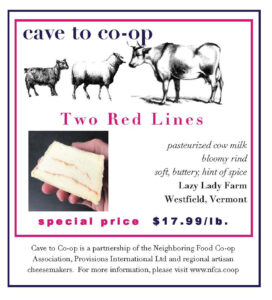
A pasteurized cow-milk cheese by Laini Fondiller, cheesemaker.
Two Red Lines is a small, soft, rounded pyramid that has its namesake lines running through the paste and a layer of ash hiding under the rind.
Laini is a woman who needs no introduction; you cannot get too far into Vermont cheese history, goat cheese, or heck, American cheese history without hearing about Lazy Lady Farm and the Goat Ladies.
Laini is one of a handful of ladies that in the 80’s brought much needed attention and acclaim to goat cheese along with legendairy cheesemakers Alison Hooper of Vermont Creamery, Judy Schad of Capriole Goat Cheese, Mary Keehn of Cypress Grove. It’s hard to find Laini’s cheeses outside of New England, and she still tends to her goats and makes the cheese on the farm, with limited help.
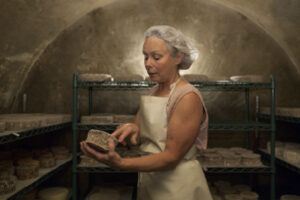 Laini started Lazy Lady in 1987 and it is as eclectic and unique as Laini herself. While not certified organic, the farm operates using organic practices: organic grains, organic straw for bedding, intensive rotational grazing, and fertile soils made from composted manure and the added minerals for hay production.
Laini started Lazy Lady in 1987 and it is as eclectic and unique as Laini herself. While not certified organic, the farm operates using organic practices: organic grains, organic straw for bedding, intensive rotational grazing, and fertile soils made from composted manure and the added minerals for hay production.
Laini operates the farm by utilizing 17 solar panels and a 1K-wind generator. When there is no wind or sun, Lazy Lady relies on a small generator to replenish the battery bank.
Laini raises and milks a herd of over 40 registered Alpine goats, a far cry from the handful of sheep and one goat named Blooper that she started with 25 years ago. Then, the farm was operated with candles, gas lamps, hand water pumps, outdoor privy and a car battery for running a radio.
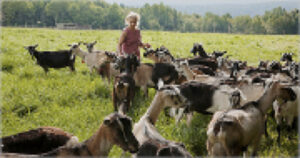
From 1987-1994 cheese was made in the kitchen. Their first licensed ‘plant’ came in 1995 and it was a 10 x 12 room where Laini made cheese in 5-gallon batches. The first proper cheese cellar was built in 1996. In 2003, with the help of a loan from the Vermont Community Fund, a larger plant with a 50-gallon cheese vat was built, allowing Laini to make cheese 5 days a week.
In 2009 a second ripening cellar was added. The old cellar is used for aged natural rind cheeses, washed rind cheeses, alpine cheeses and blue cheese. The other is used for bloomy rind cheeses. Both of these cellars are geothermal, are more than 15 feet underground and maintain temperatures of 40 degrees in the winter and 55 degrees in the summer.
Laini walks the goats in the woods, weather permitting, to ensure they eat their fair share of herbs and woodland plants. They are sincerely and lovingly cared for, each and every one. She calls them her ‘working girls’ and they are anything but lazy!
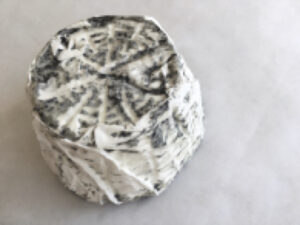 In addition to their contributions to the cheese world Laini’s goats, and their kids, helped start some well know cheesemaking operations; Twig Farm, Barn First, Sage Farm, Oak Knoll and Bridgman Hill to name a few.
In addition to their contributions to the cheese world Laini’s goats, and their kids, helped start some well know cheesemaking operations; Twig Farm, Barn First, Sage Farm, Oak Knoll and Bridgman Hill to name a few.
Laini makes many varieties of cheese, following the seasonality of her herd’s milk production. She is a woman of intense curiosity and strongly held opinions. Frequently she names her cheese to fit a particular politician or political issue of the moment: Barick Obama, Toilet Paper, and Nasty Goat to name a few.
Laini is regarded across the country as an American cheesemaker who has remained true to the art of the profession and the lifestyle of a small farmer. Working 60+ hours a week, Laini answers to no one but herself and that herd of goats. A bona fide Vermont pioneer whose cheese is consistently delicious, clean and exciting.
Two Red Lines is perfect for just eating by the wedge just off your knife, but check out the recipes below.
Two Red Lines and Bacon Pasta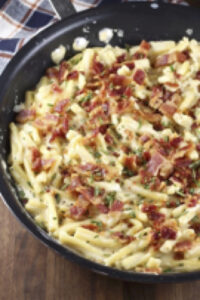
- 10 oz pasta
- 1/2 cup pasta water – reserved
- 4 pieces think sliced bacon
- 1/2 yellow onion thinly sliced
- 2 cloves garlic minced
- 1/2 lb Two Red Lines cut into cubes
- Kosher salt and freshly cracked black pepper to taste
- lemon juice to taste
- basil leaves
- Bring a large pot of water to a boil and then cook the pasta according to the package directions. Reserve 1 cup of the pasta water before draining, then drain the pasta and set it aside.
- Place the bacon in a large cast iron skillet over medium heat and cook the bacon on both sides until brown and crispy. Remove the bacon from the skillet and set it to cool on a paper towel lined plate. Once the bacon is cool, break it into bite sized pieces.
- Add the thinly sliced onion into the cast iron skillet with the bacon grease and sauté over medium high heat until the onions are caramelized, about 5 minutes. Add the garlic and toss for about 30 seconds until fragrant.
- Add the cubed Two Red Lines into the cast iron skillet along with ½ cup of the reserved pasta water and a few squeezes of lemon juice. Stir constantly until the cheese is melted and then add the cooked pasta to the mixture and toss to combine. Add the bacon and basil and season with salt and pepper as needed. Serve immediately.
Pear and Two Red Lines Flatbread
2 store-bought naan flatbreads
2 teaspoons extra-virgin olive oil
8 ounces Two Red Lines, thinly sliced
2 medium pears, cored and thinly sliced
1 teaspoon chopped fresh rosemary (optional)
Honey, for serving
Kosher salt and freshly ground black pepper
1. Preheat the oven to 400°F. Place the naan in a single layer on a baking sheet. Brush lightly with the olive oil and top evenly with the Two Red Lines, pears and rosemary if desired.
2. Bake until the pears have softened and the cheese has melted, 7 to 10 minutes. Drizzle the flatbreads with a tablespoon of honey (or more, if desired) and season with a pinch of salt and a couple grinds of pepper. Cut the flatbreads into pieces and serve warm.
Cave to Co-op is a partnership between Provision International and the Neighboring Food Co-op Association (NFCA) to support local, artisanal cheese producers in our region and make their products more easily available to co-op shoppers. The NFCA is a network of more than 35 food co-ops in our region — including yours — that are working together to advance their vision of a thriving regional economy, rooted in a healthy, just and sustainable food system and a vibrant community of co-operative enterprise. For more information, please visit www.nfca.coop.

